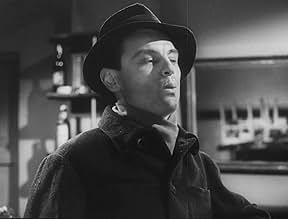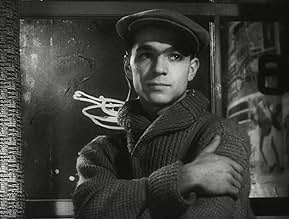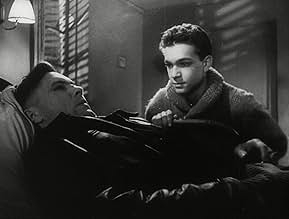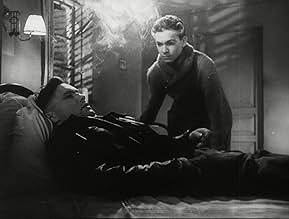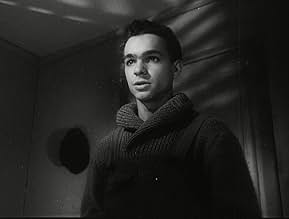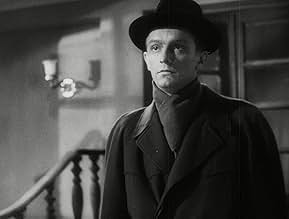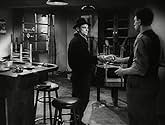IMDb RATING
6.5/10
3.9K
YOUR RATING
Two men besiege a lunch bar looking for a third man they must kill.Two men besiege a lunch bar looking for a third man they must kill.Two men besiege a lunch bar looking for a third man they must kill.
- Directors
- Writers
- Stars
- Directors
- Writers
- All cast & crew
- Production, box office & more at IMDbPro
Featured reviews
Pure genius, though a short, it sends out images of poetry and passion. Seeing an early stage of formation of majestic artistry will astonish all who sees this film. Rich and powerful, it is an element that sends emotions through all who experience this inspired film.
I rather like Hemingway's short story which the film is an exact transcription of, but I didn't feel the same things here. In fact, I didn't feel anything. There is, in the way Hemingway's text begins, a playful opacity about who is who, which obviously cannot be found in the film form. Moreover, a large part of the value of the text lies in the laid back, direct, and popular side of the dialogues, difficult to appreciate here if you don't speak Russian, of course. Nothing impressed or bothered me in the filming itself, it's neutral. The acting is very average, but it's hard to expect anything else from a student film.
My Rating : 7/10
Excellent little short film in the film-noir realm from the Russian master of cinema. The minimalist nature of it is rather absurd but I think within it the viewer must find meaning and that is genius.
Solid short film-noir.
Excellent little short film in the film-noir realm from the Russian master of cinema. The minimalist nature of it is rather absurd but I think within it the viewer must find meaning and that is genius.
Solid short film-noir.
Although I did like the 1946 adaptation of the Killers, I wasn't sure how a Russian, let alone someone who is usually much more into the visual prowess of things like Andrei Tarkovsky, would tackle Ernest Hemingway's brief, pulpy story of men on a mission and a man in hiding from those men. Turns out it's one of the best short films I've seen from a soon-to-be world renown European auteur, because of it's emphasis on the simplicity of suspense, of human action in desperate circumstances and how it's filmed with a mix of the noir style and with Tarkovsky's dependence on figures in curiously exciting compositions. He isn't alone on the film, however, as the middle scene at the apartment was directed by friend Alexander Gordon, with Tarkovsky directing the bigger chunks at the diner, and another guy Marika Beiku co-directing overall. Since the apartment scene is so short though, and accounts for just three shots, one being most elaborate as it goes in and out, tight and wide, on the morose Swede in hiding and his friend at the diner filling him in on what happened, it's mostly Tarkovsky's game here.
Part of the skill, and curiosity, in how tense the long first scene at the diner is that music is completely absent, with the only tone coming from Tarkovsky himself as a whistling customer. Meanwhile, Tarkovsky uses Hemingway's dialog in a very realistic manner, even when he goes deliberate angles, like when George goes into the back with the sandwiches and we see his feet in the same tilted frame as an empty can on the floor, or with the usage of the mirror on the wall. There's also the suddenness of seeing a machine gun that strikes things up in the room, and just the general attitude of Al and Max, the hit men, as they keep calling George "bright boy" in a way that reminds me of the curious double-talk in a self-consciously bad-ass movie like Pulp Fiction (not to mention the near casual usage of the 'N' bomb). While it ends sort of on a screeching halt, the sense of ambiguity as to the fate of the Swede as well as everyone else in the diner who hid the secret is worthwhile for the material, as it's perfectly anti-climactic. It's not entirely a simple experiment, as it's too polished for that, but I couldn't see how it could be made any longer either. It's perfectly paced and acted nearly as well, and it's a fitting pre-cursor to the un-prolific but remarkable career of one of Russia's most important filmmakers.
Part of the skill, and curiosity, in how tense the long first scene at the diner is that music is completely absent, with the only tone coming from Tarkovsky himself as a whistling customer. Meanwhile, Tarkovsky uses Hemingway's dialog in a very realistic manner, even when he goes deliberate angles, like when George goes into the back with the sandwiches and we see his feet in the same tilted frame as an empty can on the floor, or with the usage of the mirror on the wall. There's also the suddenness of seeing a machine gun that strikes things up in the room, and just the general attitude of Al and Max, the hit men, as they keep calling George "bright boy" in a way that reminds me of the curious double-talk in a self-consciously bad-ass movie like Pulp Fiction (not to mention the near casual usage of the 'N' bomb). While it ends sort of on a screeching halt, the sense of ambiguity as to the fate of the Swede as well as everyone else in the diner who hid the secret is worthwhile for the material, as it's perfectly anti-climactic. It's not entirely a simple experiment, as it's too polished for that, but I couldn't see how it could be made any longer either. It's perfectly paced and acted nearly as well, and it's a fitting pre-cursor to the un-prolific but remarkable career of one of Russia's most important filmmakers.
What the hell is that "Carnival of Colors" on Douban, the director of the 1935 film was Tarkovsky, born in 1932.
Tarkovsky's real nominal debutante is a far cry from the other master's earlier film, The Killer, which seems to have set a different style from the start. But this Tarkovsky without his later that the style of the scene shaping, on the contrary, quite a kind of Hollywood in that era of student work. But the audio-visual does have some aura, especially the fat man on the bed part especially has the style of Tarkovsky's kind of subtle mature dialogues.
The ending and some of the shaping is subtle, but not in Tarkovsky's style. Very strange lag, feels like 16 fps.
Tarkovsky's real nominal debutante is a far cry from the other master's earlier film, The Killer, which seems to have set a different style from the start. But this Tarkovsky without his later that the style of the scene shaping, on the contrary, quite a kind of Hollywood in that era of student work. But the audio-visual does have some aura, especially the fat man on the bed part especially has the style of Tarkovsky's kind of subtle mature dialogues.
The ending and some of the shaping is subtle, but not in Tarkovsky's style. Very strange lag, feels like 16 fps.
Did you know
- TriviaAll the roles were played by students of the VGIK. Moreover, props were not only brought by students from their homes, but also provided from friends and relatives.
- ConnectionsFeatured in Une journée d'Andrei Arsenevitch (1987)
- SoundtracksLullaby of Birdland
Written by George Shearing
(1952)
Whistled by the second bar patron played by Andrei Tarkovsky
Details
- Runtime
- 19m
- Color
- Sound mix
- Aspect ratio
- 1.37 : 1
Contribute to this page
Suggest an edit or add missing content

